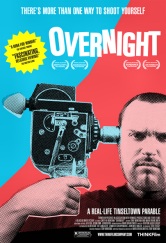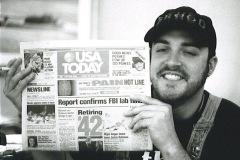| Overnight |
| |
 |
USA, 2004. Not rated.
80 minutes.
Featuring:
Troy Duffy, Mark Brian Smith, Tony Montana
Editors: Tony Montana, Jonathan Nixon, Mark Brian Smith
Cinematography: Mark Brian Smith
Producers: Mark Brian Smith, Tony Montana
Directors: Mark Brian Smith, Tony Montana
LINKS |
" 'm Hollywood's new hard on,” proclaims bartender-cum-filmmaker/musician Troy Duffy, the impossible-to-like subject of Mark Brian Smith and Tony Montana's deliciously entertaining documentary, Overnight. The proverbial flavor-of-the-month, Duffy's brush with fame and success was a rapid and turbulent ride—a quintessential true-life Hollywood tale about a career that crash-landed shortly after take off. In the end, the amazingly arrogant Duffy receives the comeuppance he deserves, but it's still somewhat disillusioning to witness his and his comrades' demise, if only because a similar fate has met much better people.
'm Hollywood's new hard on,” proclaims bartender-cum-filmmaker/musician Troy Duffy, the impossible-to-like subject of Mark Brian Smith and Tony Montana's deliciously entertaining documentary, Overnight. The proverbial flavor-of-the-month, Duffy's brush with fame and success was a rapid and turbulent ride—a quintessential true-life Hollywood tale about a career that crash-landed shortly after take off. In the end, the amazingly arrogant Duffy receives the comeuppance he deserves, but it's still somewhat disillusioning to witness his and his comrades' demise, if only because a similar fate has met much better people.
To describe Troy Duffy as a self-absorbed jerk would be too kind, and that's precisely what makes Overnight so irresistible. A surly egomaniac of the highest order, Duffy sincerely believed he would set the film and music industries on their collective ear with his array of talents, which he also felt gave him the right to abuse and dismiss all around him. As inviting as it might sound, there's no satisfaction to be gained from his undoing. It's never easy to root for the Hollywood machine even when its adversary is someone as unsavory as Duffy.
The film's directors, Mark Brian Smith and Tony Montana, were co-managers of Duffy's rock band, The Brood, and received their subject's permission to document what was supposed to be a Cinderella story. A bartender and bouncer at an unassuming Hollywood bar, the then 26-year-old Duffy makes the front pages of USA Today and The Hollywood Reporter in 1997 by selling his screenplay The Boondock Saints to Miramax for $300,000. But that's just the tip of the iceberg. Duffy, with no previous film experience, is signed to direct the movie and given a $15 million budget. Miramax inks The Brood to record the soundtrack, and Miramax head Harvey Weinstein purchases J. Sloan's (the bar that employed Duffy), supposedly with the intention that the establishment will be co-owned by the studio mogul and the hot new director.

Troy Duffy holds up the edition of USA Today featuring him (in the top right corner) in Overnight. |
Duffy immediately begins to enjoy the excesses of his new life. He hobnobs with celebrities like John Goodman and Mark Wahlberg; J. Sloan's quickly transforms into a trendy Hollywood hangout; and Maverick Records offers The Brood a recording contract prior to ever hearing the band. Duffy also has a broader plan in mind. He starts a company called The Syndicate, designed to serve as a production entity for Duffy and his friends' cinematic and musical ventures.
Suddenly, Duffy's calls to Miramax go unreturned, and he reads in the entertainment industry trade papers that the company has dropped his project. He also learns that Maverick never officially offered The Brood a contract. A smaller production company steps in to produce The Boondock Saints (at half the budget Miramax had promised) and The Brood signs with another label. (Troy constantly reminds his band mates that they have him to thank for their potential success.) This merely provides a brief glimmer of hope, though—Duffy's moment of fame ultimately elapses well shy of the 15-minute mark.
Duffy's eventual downfall is easy to foretell. It seems the only people in the world who can't envision what is to come are Duffy and his small group of sycophants. Duffy is a walking cliché of machismo and arrogance, and we've seen the blueprint of this character countless times before. This character would not be a credible creation in a work of fiction, yet in this real life tale, as predictable as it may be, Duffy's cartoon like brashness makes him a magnetic subject.
Although the subject matter more or less ensures an entertaining film, Smith and Montana display solid filmmaking skill. An especially impressive sequence crosscuts a scene of Troy playing guitar alone with another scene of him berating Smith and Montana during a band meeting for believing they should be paid for their managerial services. Running only eighty minutes, Overnight is a tightly edited documentary where every scene feels essential. With all of the fat trimmed, Duffy's antics never become excessive to the point of boredom. Somehow the directors (most likely after countless hours in the editing room) determined just how much Troy Duffy is enough. The one sympathetic character in the film is Troy's brother, Taylor, a fellow member of The Brood, whose humble demeanor makes you wonder how the two could possibly be related.
Overnight isn't primarily designed to be a cautionary tale about the dangers of Hollywood, but the documentary effectively illustrates the slippery slope of “making it” in the entertainment business. Duffy certainly may have made his own fate, but as dislikable as he appears, don't be fooled into believing that he's the only villain in this film. He wasn't the first person, nor will he be the last, chewed up and spit out by a system that routinely shatters dreams before they can even completely develop.
Review
© November 2004 by AboutFilm.Com and the author.
Images © 2004 ThinkFilm. All Rights Reserved.


